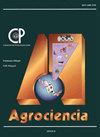ASSESSMENT OF THE GENETIC DIVERSITY OF NEW SUGARCANE HYBRIDS USING PRINCIPAL COMPONENT AND CLUSTER ANALYSES
IF 0.5
4区 农林科学
Q4 AGRICULTURE, MULTIDISCIPLINARY
引用次数: 0
Abstract
With a cultivated area of approximately 800 thousand hectares distributed in 15 states, sugarcane (Saccharum spp.) is one of the main crops in Mexico. Despite its socioeconomic importance, the genetic base of this crop has been reduced in recent decades, making the production system vulnerable to both biotic and abiotic stresses. For this reason, the Colegio de Postgraduados Campus Córdoba initiated a varietal selection program in 2009. In this study, morphological and agronomic attributes of 20 advanced hybrids were analyzed during the 2020-2021 and 2021-2022 growing seasons to determine genetic variability based on principal component analysis (PCA) and cluster analysis. Commercial cultivars widely planted in the area of influence of the Córdoba Campus (CP 72-2086, Mex 79-431, Mex 69-290 and Mex 05-204) were used as reference samples. In terms of agronomic indicators, most of the new hybrids showed higher averages than the commercial control cultivars. The hybrids COLPOSCCMex 09-50 and COLPOSCCMex 09-66 showed better germination capacity. The average height of the tallest milling stems was presented by the hybrids COLPOSCCMex 09-341 (318.1 cm) and COLPOSCCMex 09-93 (311.85 cm). The hybrid COLPOSCCMex 09-289 showed outstanding values for five variables: diameter (36.43 mm), °Brix (21.89 %), stem height (149.33 cm), leaf width (5.36 cm) and number of leaves (11.15). Morphological characterization was carried out according to 54 descriptors, combining categorical and continuous traits that were easy to observe, with a high degree of differentiation and low environmental influence. Principal component and cluster analyses showed the distribution of hybrids into five groups. These results show promising sugarcane lines with high yields, which can contribute to genetic diversity in agroecological zones where they can be adapted.用主成分分析和聚类分析评价甘蔗新杂交种的遗传多样性
甘蔗(Saccharum spp.)是墨西哥的主要作物之一,种植面积约为80万公顷,分布在15个州。尽管具有重要的社会经济意义,但近几十年来,这种作物的遗传基础已经减少,使生产系统容易受到生物和非生物压力的影响。出于这个原因,学院研究生校园Córdoba在2009年启动了一个品种选择计划。本研究利用主成分分析(PCA)和聚类分析方法,分析了20个高级杂交种在2020-2021年和2021-2022年生长季节的形态和农艺性状,以确定遗传变异。以Córdoba园区影响区内广泛种植的商品品种(CP 72-2086、Mex 79-431、Mex 69-290和Mex 05-204)为参考样本。在农艺指标方面,大多数新杂交种的平均值高于商品对照品种。杂交品种COLPOSCCMex 09-50和COLPOSCCMex 09-66的萌发能力较好。最高的铣杆平均高度为COLPOSCCMex 09-341 (318.1 cm)和COLPOSCCMex 09-93 (311.85 cm)。杂交种COLPOSCCMex 09-289在直径(36.43 mm)、度Brix(21.89%)、茎高(149.33 cm)、叶宽(5.36 cm)和叶数(11.15)5个指标上均有显著的差异。形态学鉴定依据54个描述符,结合易观察、分化程度高、环境影响小的分类与连续性状。主成分分析和聚类分析表明,杂交种分布为5个类群。这些结果显示了高产的甘蔗品系,这可以促进农业生态区的遗传多样性,在那里它们可以被适应。
本文章由计算机程序翻译,如有差异,请以英文原文为准。
求助全文
约1分钟内获得全文
求助全文
来源期刊

Agrociencia
农林科学-农业综合
CiteScore
0.50
自引率
33.30%
发文量
51
审稿时长
18-36 weeks
期刊介绍:
AGROCIENCIA is a scientific journal created and sponsored by the Colegio de Postgraduados. Its main objective is the publication and diffusion of agricultural, animal and forestry sciences research results from mexican and foreign scientists. All contributions are peer reviewed. Starting in the year 2000, AGROCIENCIA became a bimonthly and fully bilingual journal (Spanish and English versions in the same issue). Since 2007 appears every month and a half (eight issues per year). In addition to the printed issues, the full content is available in electronic format.
 求助内容:
求助内容: 应助结果提醒方式:
应助结果提醒方式:


